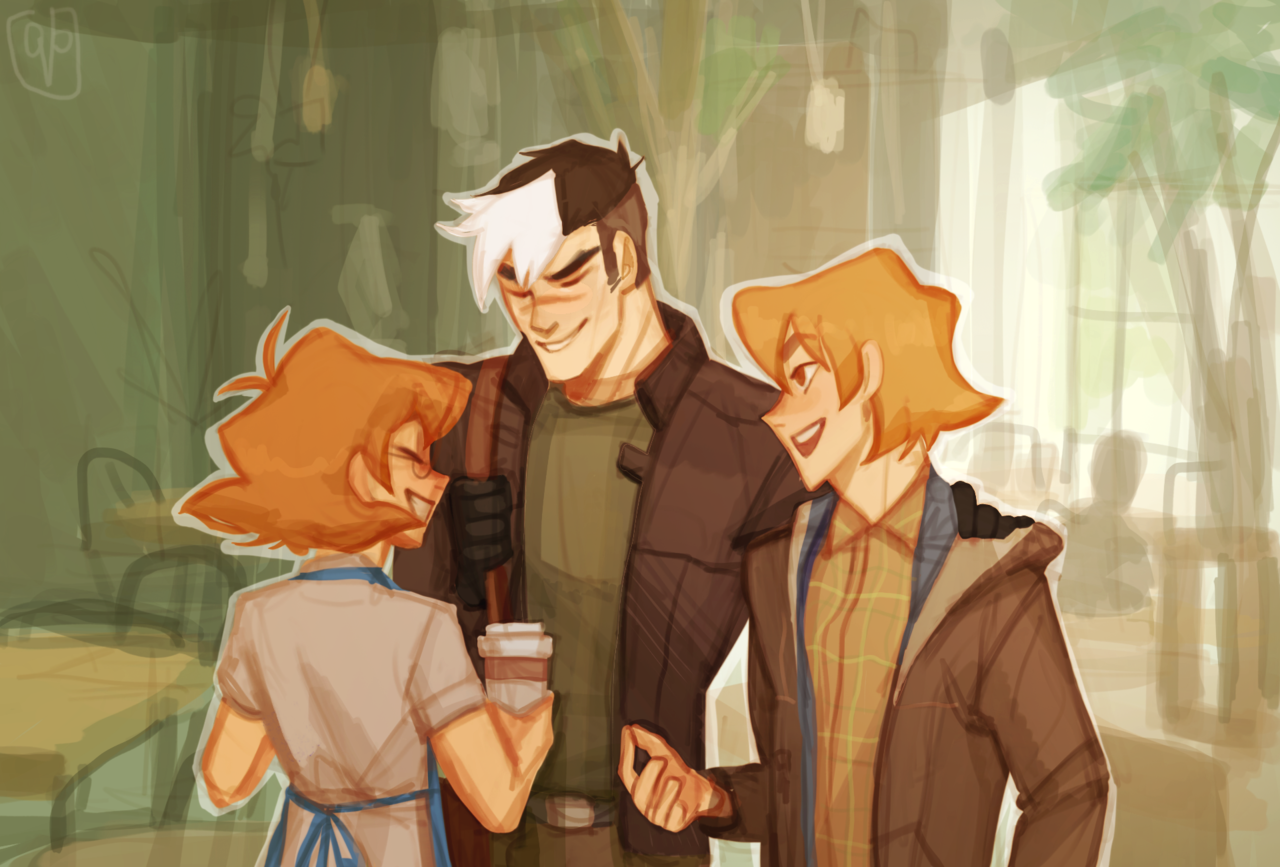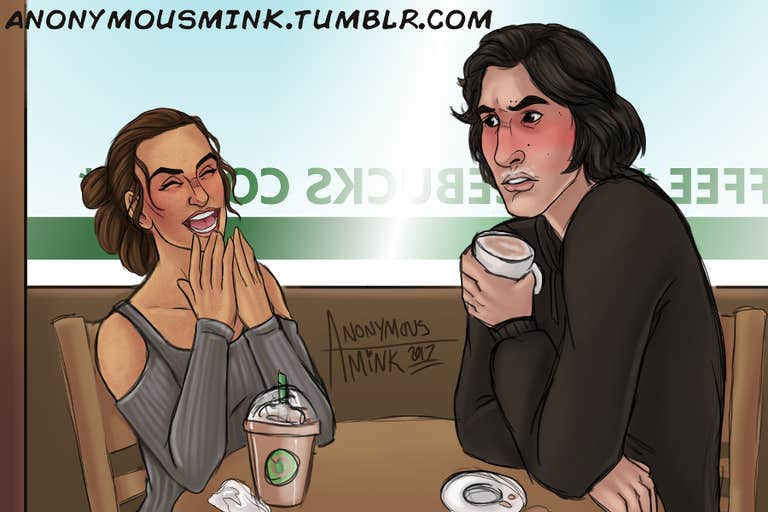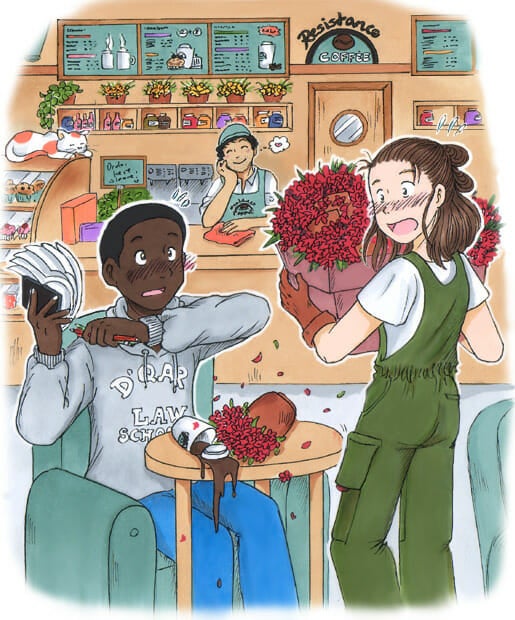Justin Timberlake sees the man walk in and swallows a sigh—it’s time to do that miserable dance again.
“Welcome to Starbucks, what can we get started for you?” he asks, brimming with fake cheer.
The buttoned-up customer is dry and detached. He orders a grande Americano, without making eye contact. He’s mindlessly refreshing Twitter.
Someday Justin will look back on this day and remember it as the moment his life changed. But for now, Lance is just another name Justin writes on a coffee cup while some other stranger tries to figure out the Wi-Fi protocol. Neither of them has any idea what’s coming.
…
One of the main appeals of fanfiction is total creative freedom. The ability to shoot for the moon of absolute wish fulfillment, unrestricted by canon and unembarrassed by personal taste. So why, exactly, do so many people write about their favorite characters working in customer service?
Coffee shop AUs (Alternate Universe fanfics) are ubiquitous, an inescapable part of the fanfic landscape. They rewrite familiar characters as baristas and coffee shop customers, setting the scene for cozy romance. The genre is thought to have begun with an *NSYNC fanfic published in 2001, whose author remarked on her website, “It started a trend, don’t you think?”
That’s an understatement.
Today you’ll find them in every fandom, from vaguely plausible choices like Teen Wolf (whose cast could theoretically work at Starbucks) to seemingly inexplicable ones like Attack on Titan, an apocalyptic anime where people regularly get dismembered on-screen. The formula varies a little—sometimes it’s a barista/customer romance, while other times it’s a Shop Around the Corner dynamic with a nearby bakery or florist—but the general gist is the same.
The coffee shop AU appears to be a fan-created genre. Plenty of other AU types have obvious pop culture origins—high school AUs, superhero AUs, vampire AUs—but “coffee shop rom-com” isn’t really a thing. The closest you’ll get is TV shows like Gilmore Girls and Friends, and while coffee shop romance novels do exist, it’s hardly a blockbuster subgenre. Which invites the question: Why would you want to see Harry Potter or Captain America make cappuccinos for 10 bucks an hour? And why did this idea suddenly become so popular in the last few years?
The universal language of coffee
Before we dig any deeper, there’s a simple reason why many fans choose to write about coffee shops: It’s easy.
“I think the coffee shop as a setting really resonates with Millennials (those writing and reading the vast majority of fic), given that many of them are either a) currently working in customer service jobs or b) have salaries where a Starbucks drink is one of the few, reliable treats they can afford,” fandom scholar Katie McCain tells the Daily Dot. She’s working on a doctoral dissertation on coffee shop AUs. “From a practical standpoint, it might be easier for some people to write or read about given its familiarity.”

Fanfic writer Claire Cullen thinks it’s about convenience: “As a writer, they’re easy enough to wrangle into an AU. … If we have Poe Dameron as a barista and Finn as a customer, you can fit Leia in as manager, Jess [Jessika Pava] as a co-worker, Rey as a friend, and Kylo as someone who works at the threatening Starbucks across the road.”
Some AUs involve complex research and worldbuilding, but if you want something simple, a coffee shop is the perfect blank slate. The basic template is universally recognizable to fanfic readers, starting with a meet-cute between the romantic leads. You can retool that premise into a goofy rom-com or an angsty drama with unrequited pining, but you’re still building from the same framework.
This generic setting is a boon to fans of something like Attack on Titan, where lighthearted romance is fundamentally incompatible with canon. You might enjoy the relationship between cynical action hero Levi and stoic commander Erwin, but if you want them to be happy, you need to give them a new setting. Fanfic outsiders often find this confusing, but it’s perfectly possible to enjoy a grim, intense piece of media while also craving the fanfic equivalent of cotton candy.
The Walking Dead fandom luxuriates in long, emotionally complex love stories about Rick and Michonne, with nary a zombie in sight. Likewise, Reylo shippers often turn to AUs in search of upbeat romance. If you want Rey and Kylo Ren to have a balanced, loving relationship after The Last Jedi, you first need to untangle their allegiance to opposing sides of a galactic war. But if you just drop them into a coffee shop AU, you can skip the 20,000-word preamble.

“Coffee shops have become a highly influential space that’s poised somewhere between the public and the private: it’s obviously a business, but it mimics the comfort of home. This means it’s a space that’s easily customizable and allows nearly endless possibilities,” McCain says. “How in the world do you get struggling art student Steve Rogers to meet billionaire Tony Stark? Easy, if Tony comes in for a coffee, ends up losing track of time as he works, and Steve strikes up a conversation once the shop closes for the night. Coffee shops are a strange equalizer that allows for [interactions] that would normally seem too far-fetched or contrived.”
Fandom in flux
When tracking a fandom trend like this, there’s a “nature versus nurture” question regarding how fanfic culture has evolved.
A decade ago, LiveJournal was the place to go. Fans posted fic there or on individual hosting sites, but nowadays most people use massive platforms like Archive of our Own (AO3) and Wattpad. They’re much more centralized and much more searchable. AO3’s search engine and tagging systems are famously detailed, allowing users to filter everything from word counts and age ratings to specific kinks and tropes. It reflects Amazon’s endlessly branching genre categories, which gave rise to hyper-specific ebook trends like bear shapeshifter romances.
Fandom has always inspired this memetic spread of popular tropes, but it’s much easier when everyone posts on the same platform. When a particular idea starts appearing everywhere, it illustrates something fundamental about the fanfic ecosystem: People aren’t just in Star Wars fandom or Sherlock fandom, they’re in “Fandom,“ period. They’re part of the overarching fanfic community, and while individual fandoms come and go, tastes remain the same. A coffee shop AU is the same whether it’s based on Supergirl or Voltron, because it caters to a different desire from the source material.
Like many popular fanfic genres, coffee shop AUs are very repetitive. Their formulaic plots hold the same reliable appeal as procedural crime shows, sitcoms, and tropey romance novels. The phrase “coffee shop AU” conjures up a specific brand, promising a love story where conflict is restricted to romantic misunderstandings and workplace stress. Speaking to fans of the genre, the same words crop up again and again: “comforting,” “warm,” “familiar.” And crucially, it’s a rare way to see queer romance depicted with zero risk of a tragic ending.
In the words of one reader, “As a lesbian, there aren’t very many comforting romantic comedies about gay characters I can watch, so coffee shop AUs are a way of seeing myself represented in those since they’re normally about gay couples.”

…
Erik Lehnsherr had a good memory for regular customers, but he would have remembered this guy either way: A handsome Englishman in a wheelchair, with unusually blue eyes and voracious appetite for books. He’d made his way through most of the cafe’s library already, piquing Erik’s interest. “A nerd after your own heart,” quipped Raven, after she caught Erik watching him from behind the counter.
So, Erik was rather disappointed to catch him scribbling in the margins of Hunt for the X-Gene by Dr. C. Xavier. Frowning, Erik stalked over to his table. “If you vandalize that, you have to replace it.”
The man glanced up, surprised. “It’s mine,” he said.
Erik paused, looking over at the shelf. Sure enough, there was his own dog-eared copy, propped up beside a volume of war photography. “My apologies,” he said stiffly.
“Is it a personal favorite?”
“Favorite” wasn’t the word he would’ve chosen. It was the most infuriating book on mutant genetics he’d ever read—and the cleverest. “Let’s just say I understand the desire to write corrections,” Erik said eventually. “As long as they’re in your own copy.”
The man grinned and held out his hand. “Charles Xavier,” he said, and Erik’s gaze flashed down to the book’s cover, echoing an all-too-familiar name. When Erik looked up, Xavier’s eyes were twinkling with amusement. “I believe you’ve heard of me.”
A very millennial fantasy
Back in the early 2000s, the ultimate fanfic stereotype was a teenage girl writing Mary Sue fiction, or an idealized heroine with uncanny charm and power, usually based on the writer herself. This type of self-inserting fiction is still going strong (in fact, fan/celebrity erotica is a staple of the self-publishing juggernaut Wattpad), but there’s been a noticeable shift away from the fantastical, plot-heavy stories of the Harry Potter era. These days, it’s not unusual for the most-read fanfic in a fandom to be a slice-of-life AU with little resemblance to the source material.
If you look at the stats for Archive of our Own, the most popular non-canon AU category is “Modern Setting.” That usually means an everyday setting like a school, college, or workplace, and the biggest hits are novel-length slash fic—love stories between two men. This type of slash fic has been around for decades, but coffee shop AUs only kicked off in the past five years or so, skyrocketing in 2016. If you were to do some armchair psychology here, you might theorize that something happened in 2016 to make people crave some comfort reading.
Coffee shop AUs redefine escapism from wild fantasies about dragons and space travel to the comforting ideal of having a steady job and supportive relationships. For a generation coming of age during the Great Recession, living in a time of constant political trauma, it’s not hard to understand the appeal. There’s a widespread hunger to see warmth and happiness in fiction, embodied in what BuzzFeed called the “radical softness” of To All the Boys I’ve Loved Before. In the words of fanfic reader Jenne, “Modern life can be weird and terrifying, and sometimes you just want something sweet with whipped cream on top.”
This desire may be even more pronounced among queer audiences, who are used to being represented by dead lesbian side-characters and sad indie dramas. And while queer romance publishing now reaches a wider audience, it’s nowhere near as productive as the massive (and free) amount of fanfic on offer. Cozy AUs fill a niche that isn’t really recognized by mainstream media. Not a fantasy about power or desire, but about comfort and safety.
Of course, perhaps the most fantastical aspect is the way coffee shop AUs romanticize workplace flirtation. Fanfic audiences are majority-female, and if you’ve ever worked in customer service, you’ll know that sexual harassment is a given. Barista crushes are relatable, but so is the awkwardness of a creep hitting on you at work. Coffee shop AUs provide an idealized view, where characters find love without having to deal with unwanted attention. And judging by the messages I received from fans who have worked as baristas, the genre does actually reflect the right atmosphere.
For Elsa, a fan who worked a lot of food service jobs in the early ’90s, modern coffee shop AUs are a source of nostalgia. “A lot of college students, and punk kids and queer kids mingled in coffee shops. There were not a lot of public spaces where you were allowed to hang out cheaply,” she explained. “Counter girl and barista were definitely the most fun [jobs], because I had the most autonomy, and it was OK for my friends to come in and hang out. So the ‘Local Hangout’ trope really resonates with me.”

A younger fan, Kate, highlighted the close friendships she had with her co-workers as a barista. “It’s just a naturally more intimate environment I think, because you spend so much time with people.” (She did wind up dating a customer, by the way.)
In coffee shop fanfic, the ensemble cast is often just as important as the central romance. Writers routinely reimagine the feuding casts of Teen Wolf or the Avengers franchise as a close-knit cross between Friends and Dykes to Watch Out For—a theme that ties into the desire for queer representation. When queer characters appear in mainstream media, they’re usually isolated in a group of straight friends. In reality, you’re much more likely to see queer people hanging out in the same social circle. So along with the desire to see queer romance represented in a warm, optimistic way, coffee shop AUs satisfy a need for queer friendship and community. Les Miserables fandom is a prime example, where most people write modern AUs about the young revolutionary characters—invariably rebooted as a diverse group of millennial activists who operate out of a coffee shop, blending progressive politics with a familiar rom-com setting.
Judging by the steady stream of coffee shop AUs being posted on AO3, the trope shows no signs of slowing down. It’s not the only trendy genre right now—soulmate AUs and Omegaverse erotica (Google it if you dare) are both very popular—but it’s still a defining feature of fanfic culture in 2018. Over the next few years, I’ll be interested to see if it spreads out into the wider world. It’s no longer unusual for professional authors and screenwriters to acknowledge their fanfic background—or even straightforwardly publish fanfic-inspired novels. Some are already publishing original fiction that’s clearly influenced by slice-of-life fanfic, like the hit webcomic Check, Please (a queer romcom series about a college hockey player who loves to bake) and Moonstruck (a queer fantasy comic set in a coffee shop). Combine that with the recent romcom resurgence, and it’s not impossible to imagine a coffee shop romance movie or bestselling novel. The audience is already out there, after all.
Inside fandom, there’s a tendency to see coffee shop AUs as kind of… basic. They’re the pumpkin spice latte of fanfiction; a comforting mass-market product whose sweetness is not to everyone’s taste. Some creators say they’re narratively simple, designed for comfort over originality. But in a media landscape obsessed with gritty reboots and edgy drama, there’s something subversive about the coffee shop AU’s guaranteed delivery of a happy ending.
After centuries of killing our darlings, fanfiction is staying with life’s ever-fleeting bright spots.


